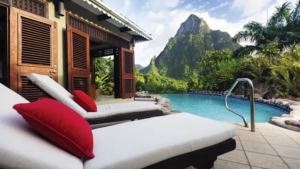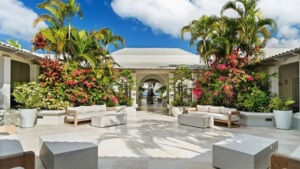
In many Caribbean islands, tourism is the lifeblood of the local economy. However, for decades, Black communities have faced barriers to participating fully in this vital industry. Centuries of enslaved labor followed by systemic exclusion from economic opportunities have historically kept Black ownership of hotels in the region disproportionately low. Despite these challenges, a transformative shift is underway, with Black-owned resorts emerging as some of the Caribbean’s most successful properties.
As we commemorate Caribbean Heritage Month this June, we spoke with three remarkable Black hotel owners about their journeys, family legacies, and the profound impact of hotel ownership on their communities.

Grenada’s Spice Island Resort, established in 1961, has been intertwined with the Hopkin family since the late 1960s. Janelle Hopkin, the resort’s president and managing director, reflects on its evolution under her late father’s stewardship as a Grenadian hotelier and industry trailblazer. “Our brand culture is rooted in the philosophy of connection through service,” she explains proudly. Renowned for its luxurious beach and pool suites on Grand Anse Beach, the resort has earned a coveted AAA Five Diamond rating and a devoted clientele.
Similarly, in St. Lucia, the Stonefield Villa Resort tells a tale of generational continuity and local pride. Anista Brown, its owner, transformed her family’s former cocoa plantation into a serene haven nestled beneath the iconic Petit Piton. Her daughter, Cybelle Brown, manages the resort today, highlighting its panoramic views and commitment to organic farm-to-table dining. “It’s about preserving our heritage while offering guests an authentic St. Lucian experience,” Cybelle shares warmly.

Contrasting these family legacies is the Osprey, a boutique resort on Great Harbor Cay in the Bahamas, founded by Daphne Delaney and her husband, John. Designed with a blend of rustic charm and modern luxury, the Osprey stands out with its private villas and pristine beachfront. Daphne, drawing on her extensive travel experiences, emphasizes their commitment to providing an exclusive and personalized retreat amid natural splendor.
The rise of Black-owned hotels in the Caribbean marks a pivotal moment for economic empowerment and cultural representation. These properties not only create generational wealth and employment opportunities but also serve as beacons of success for aspiring local entrepreneurs. “Representation matters,” asserts Janelle Hopkin. “When Caribbean youth see us thriving on a global stage, it inspires them to dream big and pursue their goals relentlessly.”
Beyond economic impact, Black-owned hotels enrich the tourism landscape by offering authentic cultural perspectives and challenging industry stereotypes. “We celebrate the traditions and hospitality of the Black Caribbean community,” affirms Anista Brown. “Our presence fosters diversity and inclusivity in the hospitality sector, contributing to a more equitable tourism industry.”
Looking ahead, the growth of Black hotel ownership promises a brighter future for the Caribbean. “Our heritage is a testament to resilience and determination,” reflects Daphne Delaney. “By building on our legacy, we pave the way for greater recognition and influence in global tourism.”
As we honor Caribbean Heritage Month, the stories of these visionary hotel owners underscore the transformative power of entrepreneurship in fostering community pride and prosperity. Their achievements not only redefine success in the hospitality sector but also inspire a new generation to embrace their cultural heritage and strive for excellence in every endeavor.


